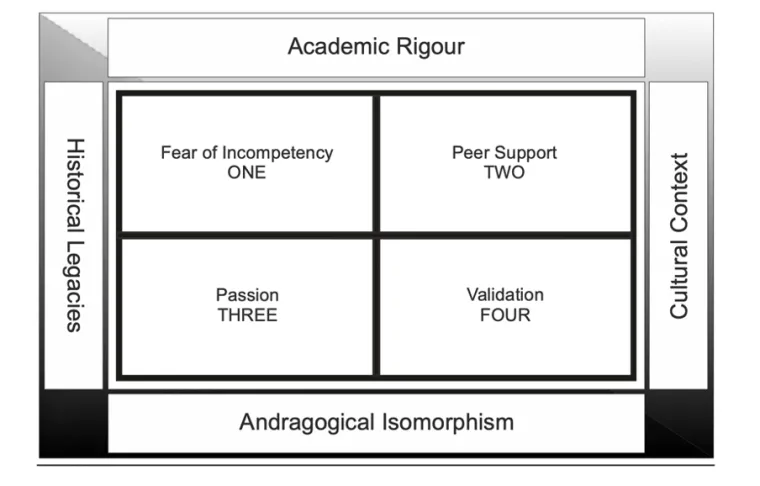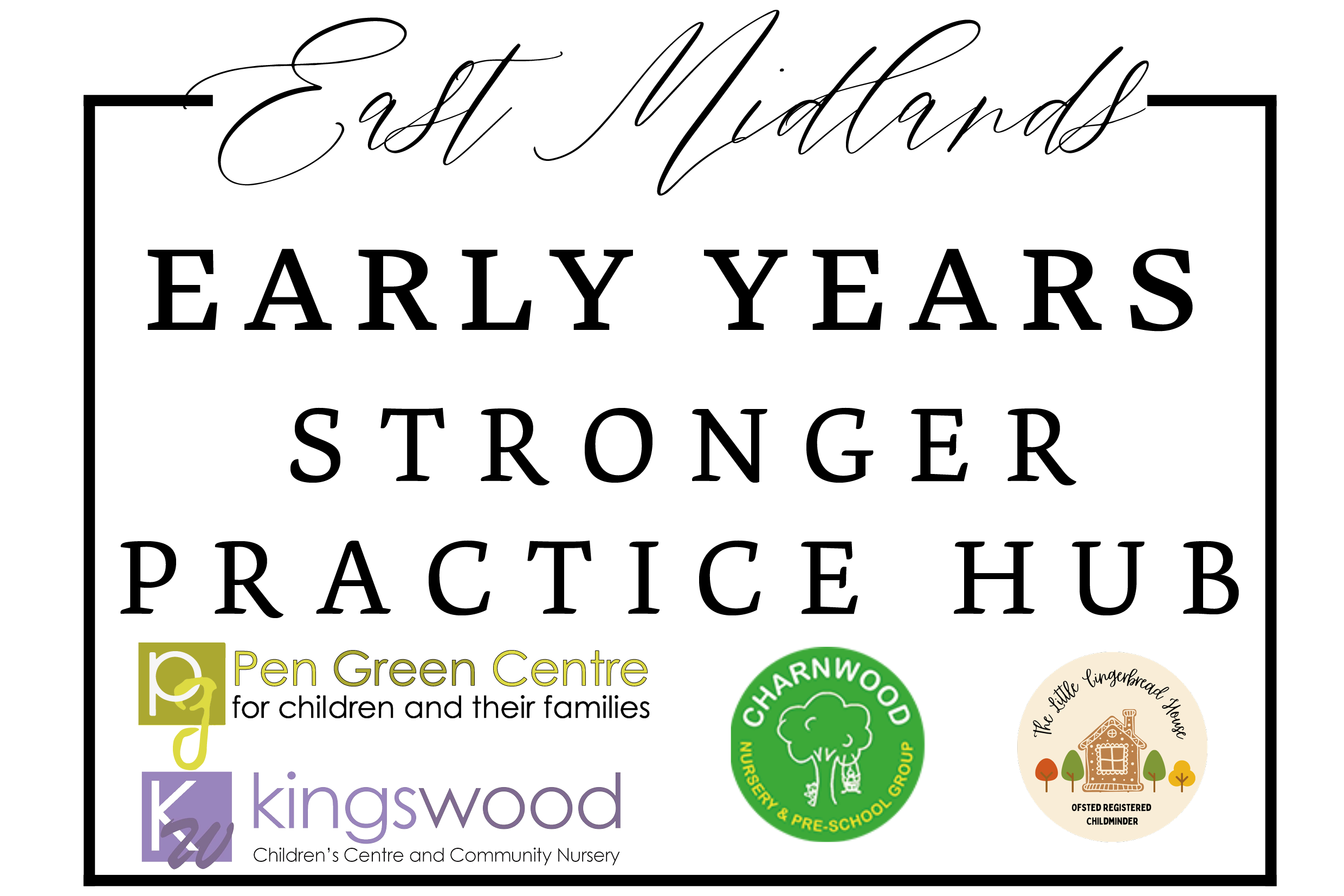Katherine Clark is a senior tutor and researcher at Pen Green Research Base. Katherine teaches across the programmes at Pen Green, from the level three Early Years Educator apprenticeship to the MA in Early Childhood and Education. Here, she presents a research project from her own MA studies, where she explored how educators can support apprentices.
Exploring a New Framework for Engaging Early Years Apprentices: Creating Meaningful Learning Experiences
Engaging Level 3 apprentices in the early years sector is no small feat. It requires understanding the complexities of adult learning, the unique challenges faced by those working with young children, and the broader historical and societal factors that shape their educational journeys. But what if we could build a framework that specifically addresses these challenges and empowers adult learners in the sector? This is exactly what my recent research set out to explore—by examining how early years apprentices can be meaningfully engaged in their learning, and how educators can support them in this process.
The Research: A Grounded Approach to Adult Learning
At the heart of this research is a grounded theory approach (Charmaz, 2006), focused on understanding the experiences of adult learners embarking on the Pen Green Level 3 apprenticeship programme. Grounded theory emphasises generating new theories directly from the data, rather than starting with pre-existing frameworks. This approach is particularly useful when exploring complex, real-world phenomena—like the experiences of adult apprentices in a sector that often doesn't get the recognition it deserves.
My research incorporated a variety of perspectives, considering historical legacies, feminist viewpoints, and the need for adult learners to be taken seriously. Early years educators need to recognise that learning isn’t just about knowledge transfer; it’s also about how learners assimilate new information and experiences into their lives. Through my research, I propose a new concept—one that builds on the idea of andragogical isomorphism (Clare and Clark, 2021)—to create a framework that supports adult learners in engaging deeply with their learning.
The Research Process: Methodology and Reflection
In order to truly understand how adult learners in the early years sector experience their apprenticeships, I adopted a constructionist epistemological position (Piaget, 1970; Feast and Melles, 2010). This approach views reality as something constructed through the interactions between individuals and their environment, and acknowledges that each person’s perspective of reality is unique and ever-changing.
The research design involved several layers:
- Philosophical Approach: I view reality as socially constructed, this is shaped by interactions and perspectives and guided my approach.
- Ontology: I explored the nature of what was being studied—the lived experiences of adult learners.
- Epistemology: I focused on how knowledge is acquired, understood, and shared in the context of adult education.
- Ethics:Layers of ethics were entwined within my research from the formal and practical step of protecting participants to working to my own ethical code of ‘doing some good’.
The data was gathered through semi-structured interviews with six apprentices and my own reflective journaling over a six-month period. This allowed me to deeply engage with the participants’ experiences and sit in the intersection of researcher and a tutor. Through this method I gained insights into their challenges, aspirations, and the barriers they faced to effective learning.
Who Were the Participants?
The participants were the first cohort of apprentices to study at Pen Green. They came from two private nurseries, and their managers were part of Pen Green’s alumni. The group was diverse in terms of age, family situation, and work experience, though all shared one thing in common: they were deeply passionate about early years education.
- Ages: 16 to 45
- Demographics: All were female and white, with two being mothers.
- Work Experience: From 6 months to 5 years in the early years sector.
Key Findings: Navigating Barriers to Learning
Several themes emerged from the data that were critical to understanding how apprentices engage with their learning. These included:
- Incompetency: A sense of self-doubt and insecurity about their abilities.
- Peer Support: The importance of camaraderie and shared learning experiences in overcoming feelings of incompetency.
- Passion: A deep love for working with children, but often overshadowed by the sector’s undervaluation.
- Validation: The need for recognition and validation of their professional worth.
Initially the themes seemed to be in tension with one another. However, as I reflected on the data, I realised they were part of a larger process of growth and transformation. I coined this process "andragogical isomorphism" a term that describes how learning experiences that address both the social and emotional needs of adult learners can lead to a profound shift in their sense of self and their place in the world of education.
A New Framework for Adult Learning in the Early Years
Drawing on my findings, I developed a new framework for engaging adult learners in early years apprenticeships. This framework was originally based on the idea of a “nesting environment” a space where learners feel supported, valued, and able to grow, then fly the nest. I further developed this idea to create a more robust framework that required a more required action from the educator. Crucially, this environment doesn’t remove the rigour of adult learning. It acknowledges the emotional and social aspects of learning, creating a balance where adults can feel nurtured while still being challenged.

Using the framework:
- Learner experience: When one zone is disproportionally overwhelming the other zones, learning becomes motionless and restrictive.
- Educator Action: Working within the boundaries of cultural contexts, historical legacies and academic rigour, the educator takes action to readdress the imbalance, so equilibrium can be achieved.
- Example: If fear of incompetency dominates the learner experience and prevents submission of work, the educator can use group tasks to promote peer support, encourage discussion of practice to reignite passion and use one to one tutorial to promote validation.
The framework emphasises:
- Recognising the Learner's Needs: Adult learners bring with them a variety of experiences, including personal struggles and professional challenges. Educators need to understand these factors and create a space where learners feel seen and heard.
- The Role of Peer Support: Building strong relationships among apprentices helps to overcome feelings of incompetency. Peer support allows learners to recognise that they are not alone in their struggles.
- Passion and Validation: Acknowledging the passion that apprentices have for their work, and validating the significance of their role in the sector is essential to retention, boosting morale and fostering a deeper connection to their learning journey.
- A Framework for Change: The process of learning in this context leads to an altered sense of self. It’s not just about gaining knowledge—it’s about transforming how learners view themselves as professionals and as individuals.
Moving Forward: Shaping the Future of Early Years Apprenticeships
My research opens up important questions about how we can continue to improve the apprenticeship experience for adult learners in the early years sector. It highlights the need for more robust conversations with employers about the value of apprenticeships, the role of online learning, and how we can better support adult learners through their educational journeys.
The framework I’ve presented isn’t just theoretical. It’s a call to action for educators to critically reflect on how they engage with adult learners, and how they can create a learning environment that nurtures growth, supports passion, and fosters validation. For apprentices, it’s a space where they can feel empowered to become the professionals they aspire to be.
Conclusion
The experiences of adult learners in the early years sector are complex, influenced by personal, professional, and societal factors. But through careful reflection and a thoughtful approach to learning, we can create frameworks that not only engage apprentices but also help them transform into confident, capable educators. By acknowledging the intersection of passion, peer support, and validation, we can create learning environments that are truly meaningful for those entering this essential field.
If you’re an educator working with early years apprentices, I encourage you to think about how you can apply these insights to your own practice. Let’s continue the conversation about how we can better support adult learners and ensure that the next generation of early years educators is equipped to make a difference.
